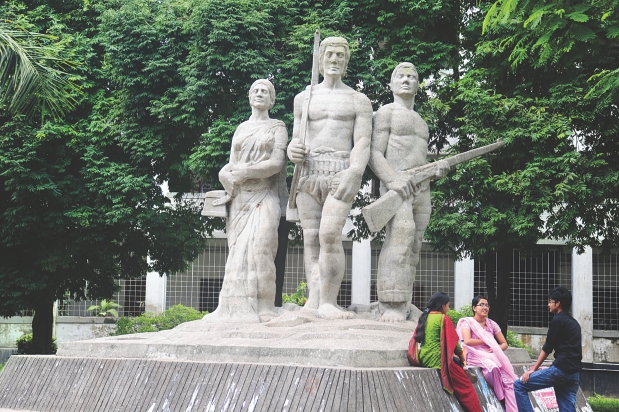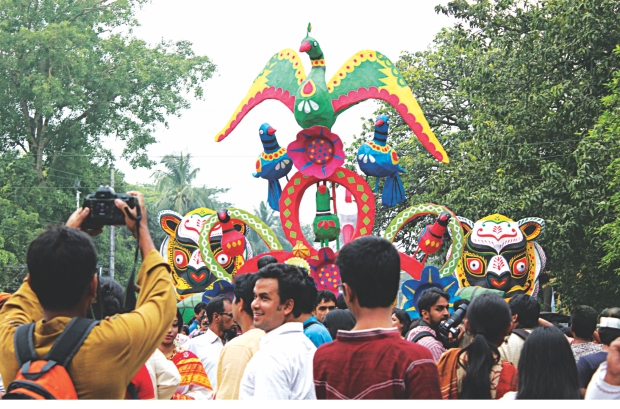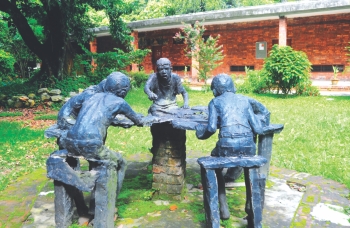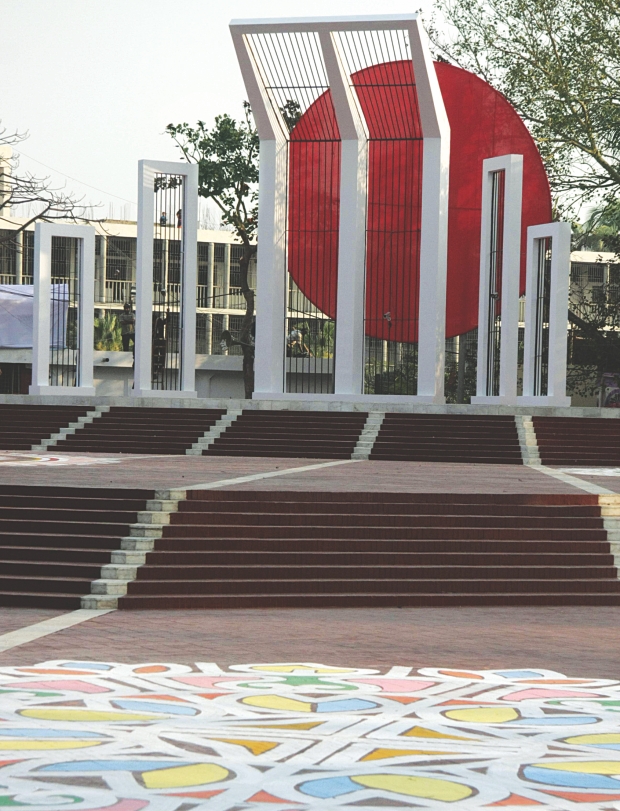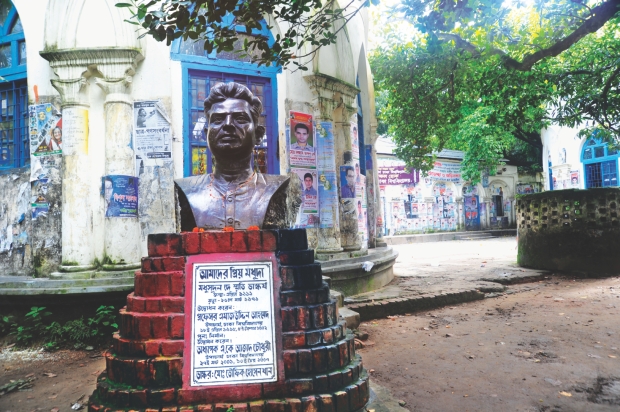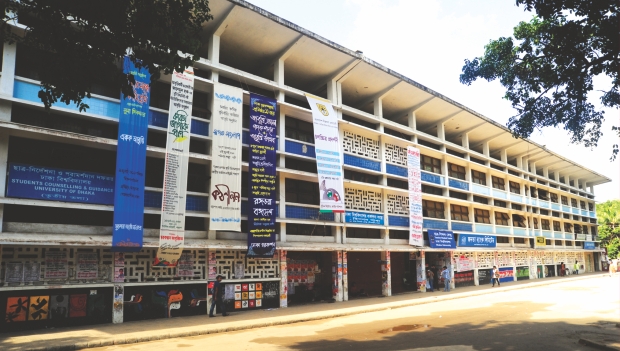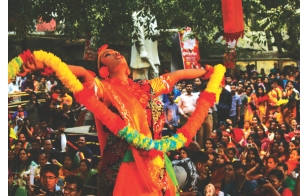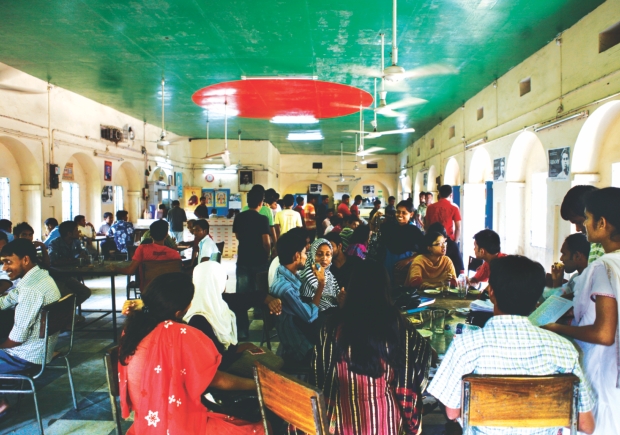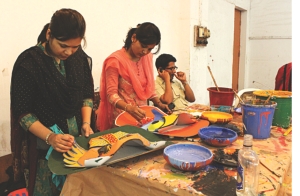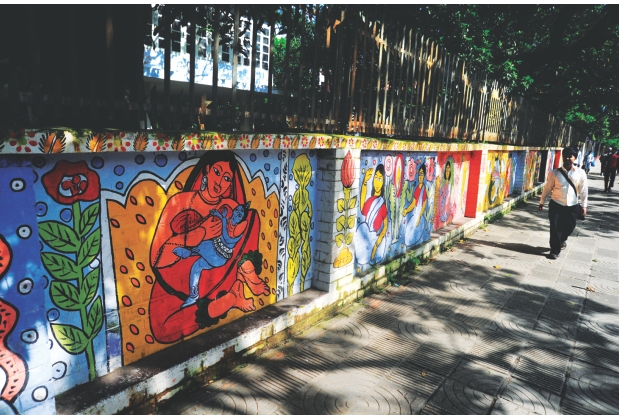| Home - Back Issues - The Team - Contact Us |
 Linking Young Minds Together |
| Volume 5 | Issue 46 | July 17, 2011 | |
|
Spotlight
The Dhaka University Experience Rakibul Hasan Education and knowledge, fun and festivity, politics and power, you name it and Dhaka University can offer you all. This year the teachers and students of University of Dhaka celebrated the ninetieth anniversary of this echelon of academic excellence on the first day of July. The institution has grown from being an education centre to the builder of the nation's future. Life at Dhaka University, in a way, represents the life of Bangladesh. Here one can have ups and downs; but all of these are the part of facing life's reality. Since its inauguration the teachers and students of this institution have been in the front row of every political upheaval, every cultural movement and, from time to time, they have enlightened the society by creating new knowledge through dedicated academic research and inventions. The University of Dhaka is maybe the only educational institution in the world which is entirely related with the rise, birth and progress of a nation.
Even the very emergence of the University of Dhaka was the outcome of a social renaissance. It was a time of great significance. The sub-continent was under the British colonial rule. The people of East Bengal (present Bangladesh) were lagging behind in terms of education as during those days Kolkata, the capital of undivided Bengal used to be the home of all quality educational institutions and thus it was quite difficult for people from our part of the world to get in touch with modern knowledge. As a huge number of people, especially the majority Muslim Community of East Bengal, felt the need for special attention of the government for the development of the region and advancement of its people, the Partition of Bengal in 1905 provided them with a ground for autonomous development and created new hopes. However the annulment of the partition of Bengal in 1911 within six years of its commencement, made the leading East Bengal based worried about the intellectual development of their people. A deputation of high ranking Muslim leaders, including Sir Nawab Khwaja Salimullah, Khan Bahadur Chowdhury Kazimuddin Ahmed Siddiky, Nawab Syed Nawab Ali Choudhury and A K Fazlul Huq, met Lord Hardinge, the then Viceroy of India, on January 31, 1912 and expressed their concern about the educational backwardness of the people of their community. As compensation for the annulment of the Partition, the high level delegation made a vigorous demand to the
Viceroy for a university at Dhaka. Realising the rationale behind the deputation's demand, Viceroy Lord Hardinge promised to set up a fully fledged university in Dhaka, the capital of the erstwhile state of East Bengal and Assam. The decision was confirmed in an official communiqué on February 2, 1912. After several recommendations from the high level committees made by the then government most especially 'the Nathan Committee' presided by Barrister Robert Nathan in the year 1912 and 'the Calcutta Commission” in 1917, the 'Dhaka University Bill' transformed into an act in the Indian legislative council in the year 1920 and the university opened its door to the students for the first time on the first day of July 1921 in a picturesque part of the city known as Ramna on 600 acres of land. Sir Philip Joseph Hartog, a former academic registrar of the University of London was appointed as the first Vice- Chancellor of the university. The teachers and students of DU observe the first of July as the Dhaka University day.
The University started its activities with 3 Faculties, 12 Departments, 60 teachers, 877 students and 3 dormitories (Halls of Residence) for the students, whereas presently the University consists of 13 Faculties, 66 Departments, 8 Institutes, 17 dormitories, 3 hostels and more than 35 Research Centres. The number of students and teachers has also risen to about 33,112 and 1,805 respectively which have made the university the largest public university of present day Bangladesh. If anyone takes a stroll down the Dhaka University (DU) campus, she/he would find a number of artistic statues commemorating the contribution of DU teachers and students in our quest for freedom. Be it the great language movement in the year 1952 which ignited the passion for an independent nation or the mass upheaval of the 1969 and the Liberation War in 1971, the people related to this great institution have always led the nation to light. The list in front of the historical Modhuda'r canteen displaying the names of the martyred teachers, students and staffs of DU during the Liberation War stands as a testimony of the great price the DU family has paid, so that the people of Bangladesh can live freely.
Since the emergence of independent Bangladesh, DU has assumed a new role of educational and cultural melting for people from all over Bangladesh and abroad. Commenting on the patterns of behavioural changes at DU campus, Syed Rezaur Rahman, the acting registrar of Dhaka University and a devoted historian of DU says, “There was a time when male students had to get special permission from the proctor's office to talk to their female classmates but nowadays students are very free with each other and they are well informed about the outside world. Students are getting many modern facilities like the internet and the based journals, about which we could never think of during our student life.” This veteran educationist who also happens to be the author of different resource books and video documentaries on the history of DU has recently arranged a photo exhibition in the Teacher Students Centre (TSC) of DU where the visitors can come face to face with many rare glimpses of DU history.
Be it the celebration of the first day of Bengali New Year or the victory day or a win of the Bangladesh Cricket Team, the DU campus has always been the ultimate place to express their feelings and joy. During the month of February, the university area get, crowded by book loving people from all walks of life who come to join the Amar Ekushey Boimela in the premises of Bangla Academy and this way the intellectual mindset of our nation receives a major boon. “Nowadays you can find huge crowds of people in DU campus even during Valentine's day. Though sometimes it annoys me to have so many people around me in any occasion but at the same time the enthusiasm of people about DU proves how important the role the university is playing to shape up the socio-cultural behavior of the people of our country,” says Farhana, a DU student from the Department of English. To show justice to the tag 'educational and cultural melting pot', the University of Dhaka has been home to a number of foreign students since its inauguration. Presently the foreign students of DU reside in the Sir P J Hartog International Hall. Shankar, a DU student from Nepal expresses his feeling on the occasion of ninetieth anniversary of his university, “It is a matter of great pride that our beloved DU is stepping into its ninetieth year. On the occasion of this Dhaka University day on July 1, we the resident students of the International hall had arranged a cultural programme in our dormitory auditorium where all the students sang the national anthems of their country of origin and we had a feast and dance as well. It was a great feeling,” says Shankar. Though the foreign students of DU are found very satisfied with the welcoming attitude of the teachers and students, some of them do face some unique problems, like Shehzad from Pakistan who says, “Everything is fine at DU. I have found my teachers and classmates very friendly and cooperative. The only problem that I am facing is that here at DU campus I cannot get a cafeteria which serves good quality Naan Rooti which was my staple food back home.”
Despite being proud on the occasion of ninetieth anniversary of their favourite alma mater, the DU students have their share of complaints regarding the lack of facilities and monotonous curriculum like students from most of the public universities in Bangladesh. Arafat, a student for the Faculty of Business says, “Most of the courses we are being taught have become notes or hand out based. As a result the students seldom look into the depth of text and reference books and though there is scope of a lot of creativity in business oriented subjects, such creativity is not very apparent amongst the students as well as the teachers anymore.” Sabbir Ahmed, another DU student from the Faculty of Science points out the limitations in field of academic research. “Though recently some noteworthy research has been conducted by the DU students and professors like the decoding of the genome sequence of jute plants, the overall scenario in the field of scientific research is not well enough. The lab facilities for the students in many science oriented departments are not sufficient. To create new knowledge and do well in the world ranking of universities, the authority needs to provide the right research environment for the students,” says Sabbir. In spite of facing some limitations, it can be said quite undoubtedly that the contribution of the teachers and students of DU in the academic, social and cultural scene of Bangladesh is ever increasing. As the University of Dhaka is stepping towards the celebration of its hundredth year anniversary in the coming decade, the nation aspires that this home of academic excellence will maintain its status as a pioneering institution and it present our country with future nation builders who can rise to any challenge for creating a better Bangladesh.
Copyright (R) thedailystar.net 2011 |
||||||
